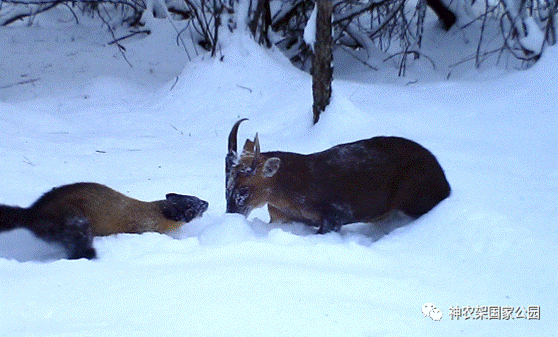[Animal Stories 2] Yellow-Throated Marten: A Deadly Killer with Deceptive Loveliness
Updated:2023-05-26 Source:Shennongjia National Park

With a lovable triangular black face, Martes flavigula, also known as yellow-throated martens, are notable for their cute appearance. As is captured by the camera traps in Shennongjia National Park, they always hop around from place to place when they move; active, agile, and full of vitality. Despite their small size, they are flexible and muscular with great fighting power.
Yellow-throated martens don't seem to walk when they move. They either jump or bounce. They only stop to scout around or mark their territory by rubbing and scratching. Yellow-throated martens are not solitary and are typically observed moving in groups of 2 or occasionally 3, sometimes in small groups, mostly from the same family.
The yellow-throated martens are typical carnivores, and their diet varies with location and season thanks to their agility. They regularly consume mice, rabbits, the Tragopan temminckii, Macaca mulatta, Muntiacus reevesi, Elaphodus cephalophus, and even sables or giant panda cubs. They won’t let off a single prey source that they catch sight of. Sometimes the ravenous yellow-throated martens will eat fruit when there isn’t any prey available.
These predators have been known to hunt prey together, increasing the chances of a successful hunt. When hunting animals that weigh ten times as much or more, they attack in pairs or even in groups, with a clear division of tasks and good teamwork. The yellow-throated martens know well how to distract and wear down their prey. They are patient and strategic, and won’t complete the final blow until their prey is powerless to resist.
The hunting success rate of this species is so impressive that there is almost no chance of survival for any prey targeted by a yellow-throated marten. In Taiwan, China, they are called Qiang Zai Tigers because they are the main natural enemies of Qiang Zai (the juvenile Muntiacus reevesi, also called Chinese Muntjac). Particularly, they have a penchant for honey, much to the annoyance of bee farmers, and many people also call them Honey Dogs. (By Du Hua and Wang Pin)
Copyright Shennongjia National Park
Address:36 Chulin Road, Muyu Town, Shennongjia Forestry District, Hubei Province 鄂ICP备18005077号-3
Address:36 Chulin Road, Muyu Town, Shennongjia Forestry District, Hubei Province 鄂ICP备18005077号-3
Email:2673990569@qq.com
Phone:0719-3453368
Phone:0719-3453368


TOP

